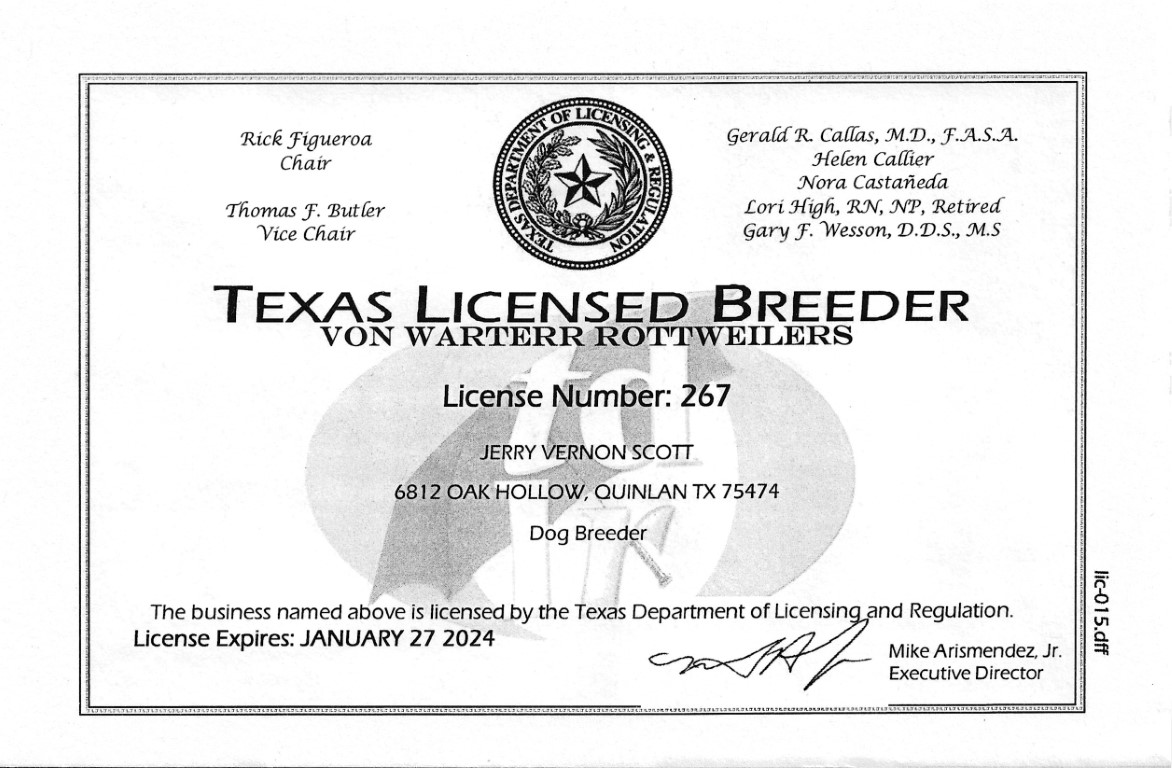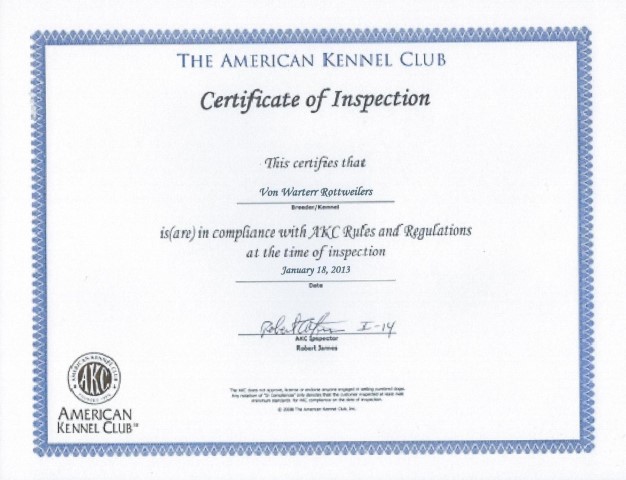Article 2 - Choosing a Breeder Who Really Cares About the Breed
Posted on April 14th, 2015
Article 2 - Choosing a Breeder - Who Really Cares About the Breed cont'd
You have studied the specifics of various breeds and you have determined that the Rottweiler is right for you and you are right for a Rottweiler. Congratulations! Now what do you do? Do you rush out and get a puppy? That is not what you do if you want a pup that is ideal for you. Your “puppy to be” is probably not even born yet. In fact, it is possible that the breeding that will produce your puppy has not even taken place yet. Nevertheless, it has been planned for months and maybe even years in advance in the mind of a dedicated breeder. Long before you will love your pup, someone else envisioned its litter. Potentially great pups are not usually produced randomly. They are produced by knowledgeable, caring, and conscientious breeders. Just because someone breeds dogs doesn’t mean that they should breed dogs, or that they genuinely care about the good of the breed. That is why the next vitally important step in getting your future puppy is choosing the right breeder. You need to choose a breeder who really cares about preserving the breed and not just about making a buck!
Breeders are the ones who ensure the continuation of the breed. All breeders propagate the breed, but only good breeders really care about preserving the breed according to the accepted written standard. Thankfully, it is not necessary to go to Rottweil, Germany to get a great Rottweiler. But you do have to do your homework thoroughly. Assuming you have already read several breed specific books before deciding on the Rottweiler, it is now time to begin researching breeders in order to determine where you will get your puppy. Start by contacting local Rottweiler clubs in your state. Active members of these clubs will be able to answer many of your questions and provide you with invaluable information as you investigate potential breeders from which you will purchase your puppy. It is also advisable to visit a number of conformation shows and/or working events. Again these competitors will prove to be tremendous assets in your search for the right breeder. Compile your list of recommended breeders and then begin contacting them for initial interviews and to schedule an appointment for you to visit them, their dogs, and their facilities.
There are two types of breeders:
- Bad breeders, often referred to as “backyard breeders,” who are motivated by financial gain
- Good breeders, reputable and responsible breeders who follow a generally accepted “code of ethics.”
Good breeders are motivated by a love for the breed and a passion to preserve the complete Rottweiler. That does not mean that their puppies will be cheap. Good breeders put a lot of time, energy, and money into their facilities, their breed stock, and the care of their litters. You can reasonably expect to pay $750-$1,000 for a pet quality puppy and $1,500-$3,000 for a show and/or working prospect. A healthy, wellbred puppy is an investment. You may pay more up front, but you will probably save yourself a lot of money down the road if you are fortunate enough to avoid the health issues that accompany many poorly bred purebreds.
Here are a few of the generally accepted code of ethics points that should be adhered to by any breeder that you are considering:
- Breed only nationally registered dogs and bitches with certified hips.
- Breed only dogs and bitches of sound temperament and proven to be free of any disqualifying faults.
- All puppies or dogs are sold with a signed written contract which guarantees the health of the dog at the time of sell. Many reputable breeders will also guarantee the dog against inheritable diseases by providing a fair replacement policy.
- Will only release puppies to go to their new homes after they have reached the age of seven weeks old. Additionally, they will provide the new owner with a schedule of recommended puppy vaccinations yet to be administered.
- Will not sell any of their puppies to a pet store or any entity who engages in any activity which might exploit the breed.
- Breeder agrees to take any of their puppies back and relocate them in a new home if a situation arises where the original buyer cannot keep the puppy. Conscientious breeders recognize and acknowledge that they have a lifelong responsibility to any and every dog that they produce in their breeding program.
Besides following a code of ethics, there are many other distinguishing characteristics of a good breeder of which you should make inquiry. Ask them how long they have owned the breed. You want a breeder with both integrity and longevity in the breed. Less reputable breeders do not stay with one breed for very long, often switching breeds according to popularity, because that is what sells. Ask them about their breed club affiliations. The best breeders will typically be active members of a national and local level breed club. Ask them if their breed stock has the recommended health certifications for our breed.
Do not be shy about asking for proof of those certifications. A good breeder will not be offended that you demand evidence of such certifications. Rather, a good breeder will be delighted that it is important to you. If a breeder cannot produce the appropriate papers or makes excuses as to why they are not presently available, then a red flag should go up in your mind that warns you not to do business with this breeder. Along the same lines, one should ask to see proof of the show and working titles of your prospective puppy’s parents. Don’t assume that just because the breeder produces a pedigree with multiple champions of record that the sire and dam of your puppy is of the same quality. Demand to see their proven credentials before agreeing to buy one of their offspring. It is also a good idea to ask the breeder for references from their veterinarian and other past clients. Ask lots of questions: the more, the better. Remember, you are not shopping. You are doing research. Breeders that are involved in a passion and not a moneymaking proposition love to talk about their dogs and the breed. They will welcome your questions. They will be knowledgeable about their dogs, their pedigrees, and the health issues of the breed. Backyard breeders lack much of this knowledge and therefore are uncomfortable when multiple questions are raised. They typically sell their pups on a “first-come, first-served” basis with very little discussion being desired.
You should also expect a good breeder to ask many questions of you as well. A responsible breeder wants to know what kind of home you will be able to provide for one of their puppies. If they do not interview you and ask you some standard questions, then this should also be a sign that something is not right.
These are some questions that you can commonly expect to be asked of you as a potential client.
- Have you ever owned a Rottweiler before? If yes, then how long did you own it and did you earn any titles?
- Where will the dog live?
- Do you have a fenced-in yard?
- Do you presently belong to any dog clubs?
- Do you plan to show or work the dog?
- Do you have any children residing at your home and if so, how old are they?
- Do you have any other pets?
- Why do you want a Rottweiler?
These are the types of questions that are usually asked by good breeders.
You will probably have a few lengthy and detailed conversations with the breeder on the phone, but at some point you need to make an appointment for a personal visit if at all possible. Unfortunately, many breeders have less than appropriate facilities. You want to make sure that is not the case with the breeder from whom you plan to get your new puppy. When you visit a kennel, you want to see that it is safe, secure, and clean. The dogs and puppies should be clean with healthy coats and trimmed nails. A puppy that has lived in an unclean environment will be much harder to housebreak later. When evaluating the puppies, check their eyes and ears carefully. The environment should not only look clean, but it should smell appropriately clean. Do not be surprised if the breeder asks you to wash your hands before handling the puppies, or if you are asked to remove your shoes before entering the puppy area to protect against the possibility of you bringing in Parvo or something else that could endanger the litter. These would be good signs that you are dealing with the right type of breeder. Always insist on meeting and interacting with the dam of the pups, and also the sire if he is on the premises. If a breeder will not allow you to have a supervised encounter with the parents, then you ought to think twice about getting one of their puppies.
The bottom line is that you have to spend the necessary time to find a reputable and responsible breeder that you are comfortable with and that you trust. I recommend that you find a breeder that you trust so much that you would be willing to allow them to pick out your puppy for you. In case you didn’t know, that is the policy of some of the best breeders. They select the puppy that they believe is best for you, based upon their
knowledge and experience. Choose your breeder carefully so they can in turn help you choose your puppy.


